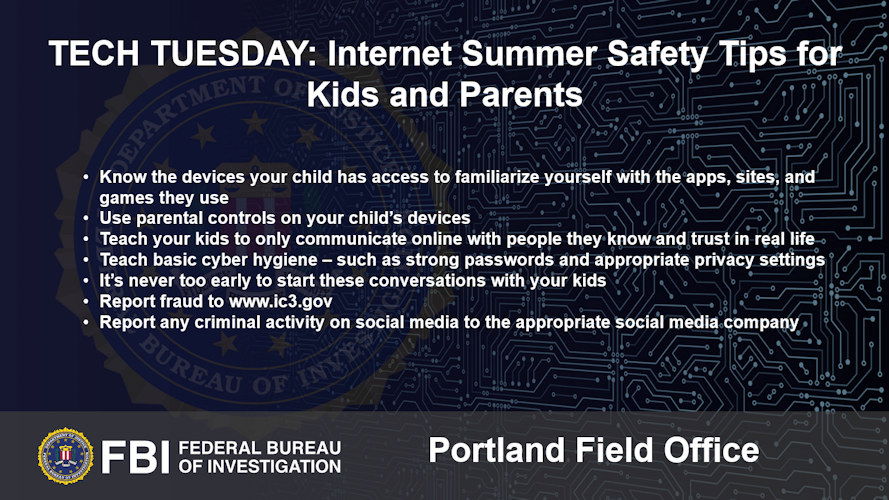Oregon FBI’s Tech Tuesday: Summer internet safety tips for parents and kids

PORTLAND, Ore. (KTVZ) -- This week's Oregon FBI Tech Tuesday report focuses on summer internet safety tips for parents and kids.
Today’s children live in a world of rapidly evolving technology that sometimes even their parents struggle to understand. Computers, mobile phones, and video games connect our children to the world, but also expose them to hidden dangers. Online predators, identity thieves, and cyber bullies use online gaming platforms, social media, and chat apps to target underage victims. Summer is here, and the summer break is a time when kids tend to spend more time online where they can be exposed to these hidden dangers.
Here are some tips for parents and kids this summer:
Be involved and understand your child’s internet activity.
Know the devices your child has access to and familiarize yourself with the social media sites, apps, and online games they use to communicate with their friends. Get involved in your kids’ online world to understand what they do online and who they communicate with. Parents should also be aware of their children’s access to the internet outside of the home.
Set clear rules and closely monitor your child’s online activity.
Take advantage of free parental control options and designate one place in the home where your children are allowed to access the internet.
Teach appropriate and safe use of the internet.
Discuss internet safety with children of all ages when they begin to engage in online activity and use internet enabled devices. The most important messages to teach are simple – many people online are not who they say they are, never communicate with people you don’t know, and be careful about what you share. Some adults use the internet to hide who they are by pretending to be an age-appropriate or relatable friend.
Teach children to communicate only with people they know in real life – friends they see regularly and trusted relatives.
Teach good cyber hygiene.
Start with the basics. Teach children to use strong passwords, choose appropriate screen names, and adjust privacy settings to control who can view their profiles. Parents should also talk to their kids about the dangers of sharing personal information such as their home address, school, or class schedule, and the consequences of posting inappropriate content such revealing photos or videos or making hoax threats.
It’s never too early to start these conversations.
These conversations not only warn children about online dangers but can open lines of communication that make it easier for kids to approach their parents without fear of judgment or punishment.
What should you do if your child does become a victim?
Do not attempt to take matters into your own hands or communicate with the predator. Immediately contact local police, your local FBI Field Office, or call 1-800-CALL-FBI (1-800-225-5324). Report the issue to the social media platform as well.
By understanding your child’s internet activity and setting rules and expectations for them, you can help direct your child towards safer internet habits. You can’t always be there when they go online, but you can empower them with the right tools to navigate the Internet safely and avoid dangerous connections.
Resources
FBI's Safe Online Surfing (SOS) program



